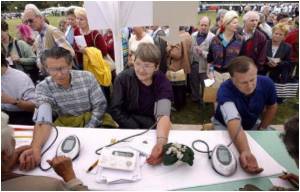Children who have hypertension are much more likely to have learning disabilities than children with normal blood pressure, a new study by University of Rochester Medical Center (URMC) has indicated.

"This study also found that children with hypertension are more likely to have ADHD (attention deficit hyperactivity disorder)," said Heather R. Adams, an assistant professor of Neurology and Pediatrics at URMC, and an author of the study.
"Although retrospective, this work adds to the growing evidence of an association between hypertension and cognitive function. With 4 percent of children now estimated to have hypertension, the need to understand this potential connection is incredibly important."
Among the study's 201 patients, all of whom had been referred to a pediatric hypertension clinic at URMC's Golisano Children's Hospital, 101 actually had hypertension, or sustained high blood pressure, determined by 24-hour ambulatory monitoring or monitoring by a school nurse or at home. Overall, 18 percent of the children had learning disabilities, well above the general population's rate of 5 percent. But the percentage among those without hypertension was closer to 9 percent, and among those with hypertension, the rate jumped to 28 percent.
All of the children were between 10- and 18-years-old, and the children's learning disability and ADHD diagnoses were reported by parents.
The study has been published in the journal Pediatrics.
Advertisement














